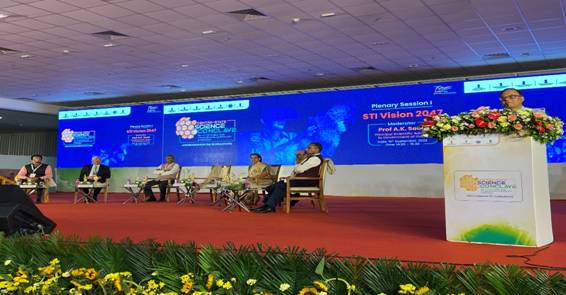Top scientific administrators across Ministries and departments discussed pathways by which science ministries can address issues and specific technology needs of the states and ways to strengthen the centre-state co-ordination for the socio-economic development of the nation.
Principal Scientific Advisor, Government of India, Prof A K Sood, highlighted the need for adequate investment in research and development from the private sector. “Some states have received substantial foreign direct investment, and some like Karnataka and Uttarakhand have made exemplary efforts in some areas like One Health Mission,” he pointed out while explaining the impact of closer linkages between the centre and states.

Showcasing the effort by DST to strengthen the State Startup Ecosystem, Secretary, DST Dr. S. Chandrasekhar said, “DST has supported startup incubation centres in places like Hyderabad and Vadodara.”
“We are working for catalysing Science Technology Innovation (STI) ecosystem in the States by facilitating human resources, S&T infrastructure & socio-economic development through appropriate partnerships and strengthening of the S&T-based delivery system,” he pointed out.
“Indian researchers at all corners of India should pursue scientific research for the benefit of society with practical application-driven innovations,” Dr. Chandrasekhar added.
Dr. Rajesh Gokhale, Secretary DBT, underlined India’s success in combatting the pandemic and said that if such a feat can be achieved in adverse situations, much more can be done in normal situations.
“The target of bioeconomy has moved up from $150 Bn for 2025 to $300 Bn for 2030. How India needs to set out a National Bio-economy Strategy for the next 25 years,” said Dr. Rajesh Gokhale, Secretary DBT
Director General; CSIR, Dr. N Kalaiselvi, advocated for technology-enabled socio-economic development in States and a balanced approach of developing technologies for urban and rural needs.
She highlighted R&D carried out by CSIR under thematic areas like smart agriculture, civil infrastructure, energy and environment, aerospace, mining, metals, minerals and materials, health care & specialty chemicals, understanding the unique characteristics and specific needs of the states and regions and bringing customized solutions for critical issues of states.
“The Ministry of Earth Sciences is translating earth science technologies like earthquake detection, weather and climate forecasting, and exploration of non-living ocean resources to services,” said Secretary Ministry of Earth Sciences Dr. M Ravichandran.
He spoke about observatories for atmosphere and ocean and data transmission, the establishment of automatic weather stations, X band radars, monitoring of coastal erosion and pollution, and dissemination of information for different stakeholders like farmers, fishermen that have brought benefits to people across India.
Shri KN Vyas, Secretary, DAE, and Chairman, Atomic Energy, shared success stories in agriculture and water technologies such as the use of isotopes to track and recharge aquifers, use of radiation technologies for preserving packaged food materials, water ATMs, and so on which can be of use to the states.
Shri S. Somnath, Secretary, DoS & Chairman, ISRO, presented ‘2047 Space Roadmap’ with a focus on pushing ahead economic aspects of space technologies.
He encouraged states to establish regional, remote sensing centres based on themes and specialties of the states. He also advocated for encouraging entrepreneurship in value-added space products.
The session created a platform for discussing the key challenges for the Technology Vision for 2047 presented by the Sectoral Group of Secretaries and solutions to propel India as a vibrant knowledge economy in the 21st century.
<><><><><>
SNC/RR
(Release ID: 1858321)
Visitor Counter : 213
